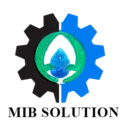MIBS: Leading the Charge Towards Sustainable Construction – Top 10 Ways to Save Water in the Construction Industry
As the world becomes increasingly aware of the pressing need for sustainable practices, industries across the board are reevaluating their operations to minimize their environmental impact. The construction industry, which traditionally has been associated with high water consumption, is now stepping up to address this challenge. At MIBS (Meticulous Infrastructure and Building Solutions), we believe that responsible resource management is a cornerstone of sustainable development. In this article, we outline the top 10 ways we can save water in the construction industry.
1. Water-Efficient Equipment and Technology: Upgrading to water-efficient construction equipment is an essential step to reduce water consumption. Utilize low-flow toilets and taps in site facilities and consider high-pressure, low-volume equipment for cleaning and irrigation purposes. Embracing water-saving technologies ensures that the necessary tasks are performed effectively while minimizing wastage.
2. Rainwater Harvesting and Reuse: Capturing and storing rainwater on construction sites can significantly offset the demand for freshwater sources. MIBS encourages incorporating rainwater harvesting systems into construction site design. Collected rainwater can be used for various non-potable purposes such as dust suppression, concrete curing, and landscaping.
3. Water Recycling and Treatment: Implementing water recycling and treatment systems can revolutionize water usage in construction. Wastewater from various construction processes can be treated and reused for tasks like flushing toilets, cleaning equipment, and even concrete mixing. This approach not only conserves water but also reduces pollution.
4. Smart Site Planning and Design: Thoughtful site planning and design can lead to substantial water savings. Adopt xeriscaping principles by choosing drought-resistant plants and landscaping features that require minimal irrigation. Utilize permeable surfaces to allow rainwater to recharge groundwater, reducing the burden on municipal water sources.
5. Leak Detection and Repair: Regularly inspecting and maintaining plumbing systems is essential for water conservation. Undetected leaks can lead to substantial water wastage over time. MIBS prioritizes leak detection and swift repairs to prevent unnecessary water loss during construction projects.
6. Water Monitoring and Management: Implement water monitoring systems to track and manage water usage on construction sites. Data from these systems can highlight areas of high consumption and enable targeted conservation efforts.
7. Education and Training: Raising awareness among construction workers and management about the importance of water conservation is paramount. MIBS conducts training programs to educate our workforce about water-saving practices, encouraging a collective effort towards sustainability.
8. Prefabrication and Modular Construction: Embrace prefabrication and modular construction techniques, which are inherently more water-efficient compared to traditional construction. Reduced on-site activities mean less water usage and waste generation.
9. Timing Construction Activities: Schedule construction activities strategically to optimize water usage. For instance, avoid concrete pouring during hot and windy periods to prevent rapid evaporation, which can lead to increased water consumption for curing.
10. Partner with Water-Conservation Organizations: Collaborate with water-conservation organizations and research institutions to stay updated on the latest technologies and practices in water conservation. Engaging with experts in the field can lead to innovative solutions and continuous improvement.
At MIBS, we believe that sustainability is not just a buzzword; it is a responsibility. By implementing these ten water-saving strategies in the construction industry, we can make a significant positive impact on our environment. As a leader in the construction sector, MIBS is committed to pioneering sustainable practices and shaping a greener, more sustainable future for the industry and the planet. Together, let’s build a better tomorrow – one drop at a time.
